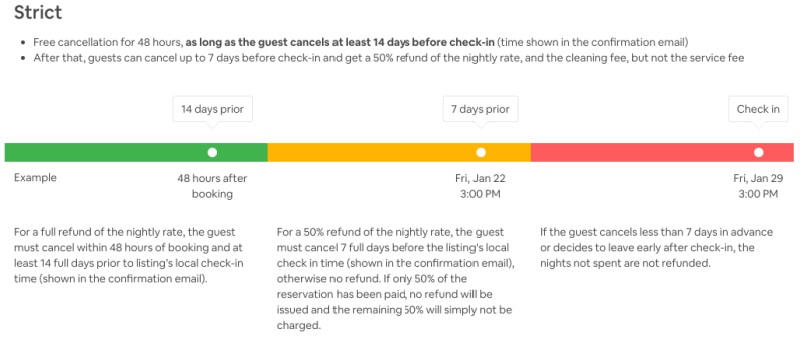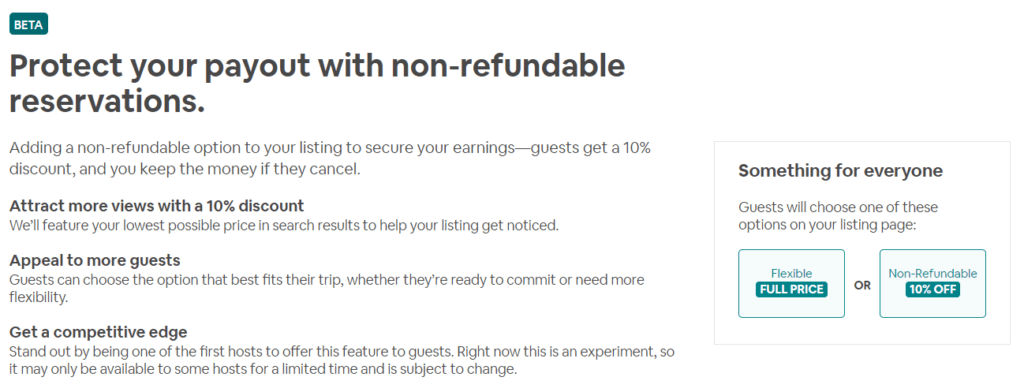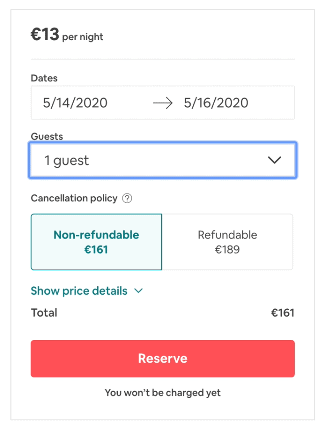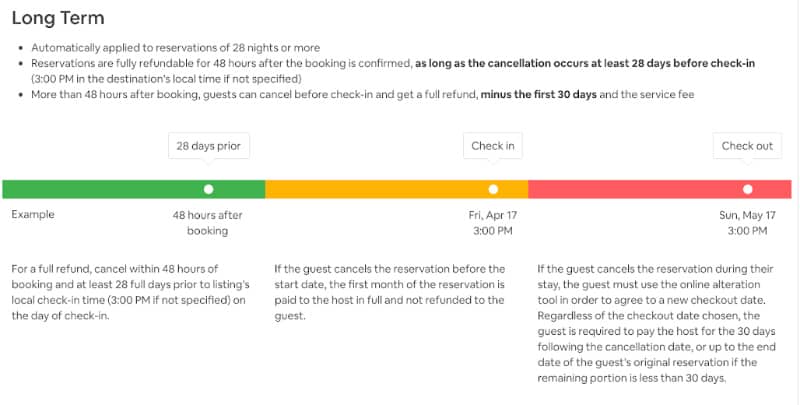A long time ago in a galaxy far, far away, Airbnb was offering only 3 different cancellation policies
- Strict
- Moderate
- Flexible
Airbnb’s 11 cancellation policies and options
Now, these are the choices that some Airbnb hosts can have:
- Flexible – Full refund 1 day prior to arrival
- Flexible or Non-refundable – In addition to Flexible, offer a non-refundable option—guests pay 10% less, but you keep your payout no matter when they cancel.
- Moderate – Full refund 5 days prior to arrival
- Moderate or Non-refundable – In addition to Moderate, offer a non-refundable option—guests pay 10% less, but you keep your payout no matter when they cancel
- Strict – Full refund for cancellations made within 48 hours of booking, if the check-in date is at least 14 days away. 50% refund for cancellations made at least 7 days before check-in. No refunds for cancellations made within 7 days of check-in.
- Strict or Non-refundable – In addition to Strict, offer a non-refundable option—guests pay 10% less, but you keep your payout no matter when they cancel.
- Modified Strict (under test) – Full refund for cancellations up to 30 days before check-in. If booked fewer than 30 days before check-in, full refund for cancellations made within 48 hours of booking. After that, 50% refund up to 7 days before check-in. No refund after that.
- Modified Strict or Non-refundable (under test) – n addition to the modified Strict policy, offer a non-refundable option—guests pay 10% less, but you keep your payout no matter when they cancel.
- Super Strict 30 Days (not open to new properties) – 50% refund is given if the guest cancels a reservation at least 30 days before check-in.
- Super Strict 60 Days (not open to new properties) – 50% refund is given if the guest cancels a reservation at least 60 days before check-in.
- Long term – Guests can cancel for a full refund only during the 48 hours after booking, and only if they cancel at least 28 days before check-in.
What are these new cancellation policies? We will focus here on the modified strict cancellation policy, the non-refundable cancellation options, and the mandatory long-term cancellation policy.
Airbnb’s modified strict cancellation policy (BETA – A/B testing)

Airbnb is currently testing a new version of its strict cancellation policy. Let’s have a look at what this policy is about, how we can tell that is an experiment, and how it compares with Vrbo’s set of policies.
What is Airbnb’s Modified Strict cancellation policy?
Some hosts can see the following message in their Airbnb Hosting dashboard:
BETA – Try out a new cancellation policy Based on feedback from hosts, we’d like to add a new cancellation policy that protects your income like Strict but gives guests more confidence to book.
Here’s how it works:
- Guests can cancel for a full refund until 30 days before check-in
- After that, it’s like your current Strict cancellation policy—you get paid 50% for all nights if they cancel up to 7 days before check-in and 100% of nights if they cancel with fewer than 7 days before check-in
- If guests book between 30 and 14 days before check-in, they have 48 hours after booking to cancel for a full refund.
So, how different is this new Strict cancellation policy, really?
- It is less strict, as guests can easily cancel a reservation: In the current Strict set-up, they only have a 48-hour grace period after booking to cancel. In the Modified Strict, they can cancel any time before 30 days of the check-in date.
- Bookings for within 30 to 14 of the check-in date are still subject to the 48-hour grace period. If guests book between 30 and 14 days before check-in, they have 48 hours after booking to cancel for a full refund

What are the conditions for the beta testing of Airbnb’s modified strict cancellation policy?
Airbnb hosts have access to this new cancellation policy on an invite-basis only. They can either choose to keep their current strict policy or opt-in for this experiment.
The policy is under a BETA status, which means that Airbnb is not sure whether they will keep this policy or not. This is actually an experiment done by the Airbnb product team, to see whether this new policy would be better than the old one.
It looks like A/B testing, as Airbnb informs hosts that “your guests will be randomly assigned one of these two policies.”. As a result, 50% of the guests will see the A version of the listing, with the current Strict policy, while the other 50% will see the B version of the listing, with the Modified Strict policy. Airbnb’s Engineering team has a great blog where they talk about Experimenting at Airbnb.
To decide which version of the Strict policy to keep, Airbnb may look into metrics such as:
- The difference in the number of reservations and the number of actual stays
- The difference in payout for the hosts and revenues for Airbnb
- The difference in the number of calls to Customer Service (a cost factor), from the hosts and the guests
- The number of hosts opting-out of the test to get back to their original Strict policy.
Airbnb vs Vrbo cancellation policies
To understand Airbnb’s new cancellation policies, we will also reference those of its competitor Vrbo:
- Refund – No refund offered for any reason or timeframe.
- Strict – Bookings canceled at least 60 days before the start of the stay will receive a full refund
- Firm – Bookings canceled at least 60 days before the start of the stay will receive a full refund. Bookings canceled at least 30 days before the start of the stay will receive a 50% refund.
- Moderate – Bookings canceled at least 30 days before the start of the stay will receive a full refund. Bookings canceled at least 14 days before the start of the stay will receive a 50% refund.
- Relaxed – Bookings canceled at least 14 days before the start of the stay will receive a full refund. Bookings canceled at least 7 days before the start of the stay will receive a 50% refund.
In a way, Airbnb’s new Strict cancellation policy is somewhere between Vrbo’s Moderate and Relaxed policies.
- In both cases, bookings canceled at least 30 days before the start of the stay will receive a full refund.
- For bookings canceled at least 14 days before the start of the stay, the Vrbo partner will refund 50% of the amount, just as an Airbnb host. Unless this an Airbnb booking made between 30 and 14 days before check-in, where Airbnb guests have 48 hours after booking to cancel for a full refund.
- Between 14 and 7 days to check-in, Vrbo issues no refund, while Airbnb issues a 50% refund.
- Under 7 days, no refund at all, neither on Airbnb nor on Vrbo.
The rise of Airbnb’s non-refundable cancellation options
We’ve seen that Airbnb was now recommending that hosts added to their existing cancellation policy (either Flexible, Moderate, Strict, or Modified Strict) a non-refundable option.
Why makes non-refundable options attractive? Refundable vs non-refundable.

Non-refundable options can be interesting to all the parties of a booking made on a vacation rental listing site:
- For the guest, a non-refundable rate is lower than a rate that comes with a cancelation option (e.g., on Airbnb, non-refundable are by standard 10% lower than those of cancellable reservations)
- For the host, it is a promise for more guaranteed revenues and a lower cancelation rate. With a non-refundable rate, guests pay the full price if they cancel, make changes, or don’t show up.
- For a platform like Airbnb, it means increasing overall booking revenues. Bigger diversity of rates and cancellation options ensures that more guests can tailor their stay according to their preference. The additional non-refundable rate is something that rivals like Expedia and Booking.com have been offering for years, as it is a very successful strategy used in hotel revenue management.
What is a non-refundable option? What is a nonrefundable booking?
Imagine that you are buying an airline ticket. For the same seat, on the same date, you may find two prices:
- a basic price (non-refundable)
- a higher price, which offers an option to cancel your ticket if you need to (refundable)
Thus, the airline sells an option to cancel your ticket and to get your money back. You pay more, but if you need to cancel, you can get a refund.
For a property owner or manager, offering guests the right to cancel is also a service. It may come with costs for the hosts, such as time (e.g., handling the cancelation request and communicating with the guest) and lost revenues (e.g., if no one books the property again, then you will lose the opportunity to sell ancillary services, such as massages, a private chef or Disneyland passes).
How can you offer a non-refundable option on Airbnb?

You cannot set your listing as 100% non-refundable. It would mean that when guests book it, they can never cancel and get their money back.
To access the non-refundable option, you need to combine it with a standard Airbnb cancellation policy:
- first, pick a cancellation policy among Airbnb’s standard ones (e.g. flexible, moderate, or strict)
- and then, if you want to, you can add a non-refundable option to your flexible / moderate / strict cancellation policy.
Non-refundable bookings are cheaper for guests
A non-refundable booking comes with a lower price than a booking that offers guests the right to cancel it and get money back (a refund). On Airbnb, the non-refundable option comes with a set discount of 10% off your standard rates.
For instance, if your standard rate, with a flexible cancellation policy, is $100, then your rate for a non-refundable booking will be 10% lower, i.e. $90.
Note that Airbnb hosts cannot change this standard 10% discount offered with non-refundable bookings.
Why would add a non-refundable option to your existing Airbnb cancellation policy? Why do guests value the choice? Why do non-refundable options statistically increase the number of bookings that you can get?
In essence, adding the non-refundable option is giving more choice to guests. It is also a way for you to give a price to the cancellation service that you offer.
On the one hand, guests get the same property, for the same dates, for 10% less than the standard cancelation policy rate. For guests who know what they want and who are certain to come to your place, this is a deal that makes sense. Now, some guests may value the right to change their minds. They may prefer paying more overall, but being able to cancel the booking under a flexible / moderate / strict cancelation policy rather than lose all their money.
So, guests may see it as a discount. As an Airbnb host, you may see the other way round: The non-refundable rate is your basic price. How much should price your cancellation service? Again, Airbnb guides you by making it a standard 10% discount. Given Airbnb’s knack for experimentation, you can bet that they’ve tested what percentage made the most sense.
By giving more choice to guests, you can increase your number of bookings. You may also even increase your revenues. This is what happens statistically overall for properties. This is what Airbnb states: Hosts in our pilot earned 5% more on average after choosing to offer a non-refundable option, individual host performance may vary.
What are the fine prints for hosts, when it comes to non-refundable rates on Airbnb?
- 10%, leave it, or take it. Hosts can choose to offer a non-refundable option—guests get a discount (10% is standard in all countries/regions except China) off the base price.
- The cleaning fee is not refunded. Hosts keep their entire payout if a guest cancels, minus the cleaning fee if the cancellation occurs before check-in.
- Be careful; discounts and promotions stack up. This non-refundable discount will be combined with other discounts you offer (ex: weekly, monthly, early-bird).
- Force majeure may make your non-refundable refundable. Guests may also cancel for extenuating circumstances (documentation required) and get a full refund. This is what happened in March 2020 when Airbnb abruptly modifies its cancellation policies and forced hosts to refund guests;
Airbnb’s standard Long-Term Cancellation Policy: Mandatory for stays of 28 days and more
Another cancellation policy has seen renewed interest since March 2020 and the start of the COVID-19 crisis: The long-term cancellation policy for monthly stays on Airbnb.
Airbnb’s Long Term cancellation policy applies to all stays of 28 days or longer and overrides a host’s standard cancellation policy for those stays.
The Long Term cancellation policy allows guests to cancel for a full refund only during the 48 hours after booking and only if they cancel at least 28 days before check-in. If a guest cancels after that, you’ll get 100% for all nights spent, plus 30 additional nights. If fewer than 30 days remain on the reservation at the time the guest cancels, you’ll get paid 100% for all remaining nights.







